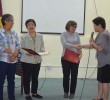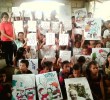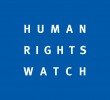PHILIPPINES: Election violence and corruption expose the rotten state
of the justice system
With the conclusion of the legislative and local elections in the
Philippines on May 14, the extent of deaths, violence and corrupt
practices that have occurred during this electoral exercise is
extremely appalling. This violent exhibition of democracy has cast
serious questions upon the capability of the government, in
particular the Philippine National Police (PNP), to execute their
duties and responsibilities to protect the lives of the people,
enforce laws and uphold order. As of May 15, the PNP reported 126
deaths from election-related violence since the beginning of the
campaign several months ago. Each of these cases demonstrates the
ugly reality of the state of law enforcement in the country.
For armed men to conduct grenade attacks at polling precincts and
schools, kill candidates and their supporters, murder teachers
serving the voting process, carry firearms despite a gun ban, among
other irregularities, demonstrates how the law enforcement
authorities have lost control of maintaining law and order. Violence
in some areas was so intense that the election was declared a
failure. What has gone so wrong in the Philippines that even the
simple political exercise of holding an election is almost impossible
to do peacefully? These armed men, however, were able to violently
disrupt the election and sow fear among the electorate, yet they were
able to do it so easily and with impunity.
When the police force is no longer able to execute their law
enforcement duties, in particular to provide protection and uphold
order, an enormous number of deaths and violence become inevitable.
These armed elements knew fully well that they would not be
prosecuted and held accountable for their acts. The police, in fact,
appeared to be totally helpless.
The admission of difficulty by a senior police colonel to maintain
law and order in Abra Province in the northern Philippines deserves
an in-depth reflection of the extent of violence that can be
unleashed when the policing system no longer functions; for in this
province, the cycle of violence and deadly electoral rivalry
subconsciously became part of life. In this environment though, the
police were powerless to enforce the law, including a gun ban, and
stem the electoral-related violence.
It is not only the culture of violence that is at fault but also the
toleration of such extensive violence that goes unchallenged that
contributes as well. Moreover, the failure of the country’s legal
system has worsened the situation. The lack of law enforcement has
become so pervasive that ordinary people attack perpetrators as a
form of instant justice, thus furthering lawlessness in the country.
In such a climate, there is no amount of changing society’s morals or
values, as the police claim, that can stop the violence that the
people are forced to accept as a way of life.
What is also shocking is the level of acceptance by the people,
whether candidates or the electorate, of corrupt practices during
elections. Vote-buying and other forms of corruption during elections
is public knowledge and a widely known phenomenon in which candidates
are expected to give and voters are expected to receive money. The
level of silence and tolerance of this corrupt practice though is
shocking. The candidates even bribe voters in public. Some citizens
consider it a good gesture rather than an act of bribery and that
these candidates are worthy of their votes. There is a mentality that
has developed in which voters question why they cannot cast their
ballot for candidates who distribute money when they even vote for
those who do not give them money at all.
The level of corrupt practices has even reached a point where
politicians accused of vote-buying have felt that they too may be
victims; the way in which elections are conducted shocks them as
well. There is no end to the creative forms of electoral corruption:
reports of missing election materials and ballot boxes, election
documents found inside a political rival’s quarters, a massive
increase of a questionable number of registered voters,
disfranchisement of voters, names of deceased persons allowed to vote
and so on. Although these practices are common during election day,
people often do not consider their gravity and implication for the
long-term governance of the Philippines. If this is how Filipinos
elect new senators, members of Congress and local leaders, what kind
of leadership and good governance can be expected from them in the
future?
What is also appalling is the government’s denial and apparent lack
of will to acknowledge and accept that there is something
systemically wrong with the electoral process. This apathy to the
failure of the country’s electoral system is especially evident in
the response of the PNP to the recent election; for despite 126
recorded deaths, the violence that has taken place, the declaration
of the failure of the elections in several areas, among others, it
has described the May 14 elections as “generally peaceful” compared
to previous elections. This reaction, however, is merely a
superficial comparison with previous elections. Why is any violence
tolerated, especially by the PNP? Why are the systemic defects of
elections not condemned and resolved? Regardless of the number of
cases and incidents reported, the fact that violence and corruption
continues unabated during elections cannot be justified and, in
effect, condoned. The PNP must acknowledge the deteriorating state of
its police work and seek to improve it instead of concluding that the
conduct of the May 14 election is better than earlier electoral
exercises.
The absence of enforcement of the law during elections is merely a
reflection of the state of the justice system in general, however. It
is the lack of legal remedies within the existing criminal justice
system in which perpetrators are supposed to be held accountable that
worsens the condition of the state of lawlessness and injustice. For
instance, a lawyer who practiced law in Jolo on the island of Sulu
for many years described how his clients have suffered injustice as
the result of judicial delays. For more than 40 years of his legal
career, “not even one of the cases �handled
prospered,” he lamented. This sorry state of this
conflict-ridden island’s judiciary has forced the people to resort to
extrajudicial practices. It is also on this island where violence,
even during ordinary days, has virtually become part of everyday
life.
When the existing system of law enforcement and justice no longer
function properly, the worst forms of violence, corrupt practices and
state of lawlessness become inevitable. They have become a way of life
where the people are subconsciously forced to accept them. What can be
observed in the recently concluded May 14 election is the ugly reality
of the country’s deteriorating law and order conditions as a result of
the systemic denial of legal redress for victims of violence. Without
addressing these defects in the country’s legal system, meaningful
elections in the Philippines are just a dream.
# # #
About AHRC: The Asian Human Rights Commission is a regional
non-governmental organisation monitoring and lobbying human rights
issues in Asia. The Hong Kong-based group was founded in 1984.










